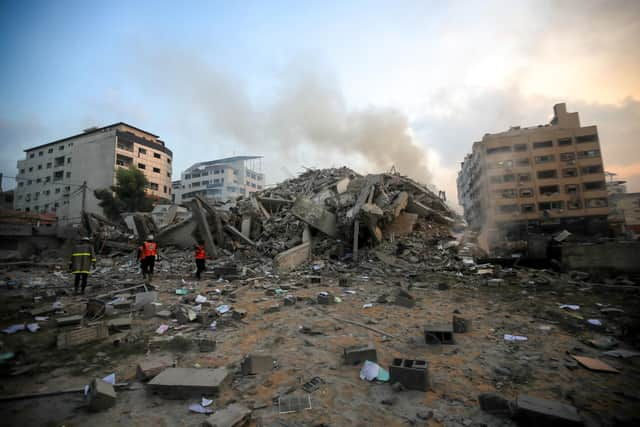Israel cannot allow its enemies to repeat what happened in October - Patrick Mercer
It has seemed that the Israel/Palestine conflict has been almost insolvable with a litany of presidents, premiers and statesmen promising yet another deal, yet another breakthrough which is always greeted with acclaim which lasts only until the next bomb blast, the next shooting before we’re back to square one.
This time it’s different, though. The days of quick Israeli wins - today’s version of the Six Days’ War - have disappeared. That’s not because of any Israeli incompetence or lack of resolve, though, it’s because Netanyahu simply cannot allow his enemies to repeat what happened in October and his solution is going to have to be thorough, bloody and lengthy.
Advertisement
Hide AdAdvertisement
Hide AdNow, I thought that Israel’s wide spread mobilisation and the subsequent campaign was going to be time limited by the need for her to get her reservists back to their civilian jobs and keep the economy moving. I think it’s an indication of just how seriously Israel is taking the threat to her existence that that isn’t the case. Clearly, the severity of the danger justifies the risk to financial well being.


Meanwhile, pressure is growing on Israel to curtail her operations against Hamas and their allies, the human cost to both terrorists and civilians now being considerable. Obviously, as a civilised country, Israel takes the humanitarian angle extremely seriously, but she must weigh this against the avowed intentions of her foes to wipe the Jewish peoples off the map. The result of all this is that we are going to be faced with a long period of sustained violence in and around Israel’s borders and the oceans thereabouts for months to come. There will be financial costs to the West and the humanitarian crisis will grow: our government must be ready for this.
In parallel but now less in the spotlight is the grinding war in Ukraine. The fact that that campaign is less in the public’s eye is crucial, for many who were distracted by the situation in Israel have neglected the dire emergency which is emerging. And when I say ‘neglected’ I don’t just mean the well meaning but largely supine population whose contact with this war goes no further than a website or two, I mean the Western governments who provide the money and materiel support without which Kiev is going to go under. Much has changed there over the past few weeks.
Take the US campaign assessment organisation the Institute for the Study of War (ISW). Despite their claims, I’m sceptical about the impartiality of many of ISW’s reports: Ukraine’s efforts seem always to be portrayed in the best possible light and, similarly, no one can be blind to the political involvement of its owners. Nonetheless, its painstaking reporting makes it invaluable so, when its authors produce comments like this:
Advertisement
Hide AdAdvertisement
Hide Ad“ISW has assessed that the collapse of Western aid would likely lead to the eventual collapse of Ukraine’s ability to hold off the Russian military and that the current positional war in Ukraine is not a stable stalemate because the current instable (sic) balance could readily be tipped in either direction by decisions made in the West.”
It’s important to pay attention as the normally optimistic ISW is ringing a deeply sonorous alarm bell.
This is underlined by a New York Times article (again, a firm supporter of Ukraine) which referred to Kiev’s plight as a ‘crisis’ and which inspired the ever optimistic Volodymyr Zelensky to say on December 13 that his decision to order only defensive operations did not a amount to a ‘crisis’, but simply a realistic decision taken in the face of appalling weather conditions which make fighting very difficult.
He might have been better not to respond at all, for these words have caused many to enquire about Ukrainian casualties, lack of replacements, a shortage of ammunition and combat supplies generally and to conclude that the ‘crisis’ does exist and that Ukraine cannot fight on for much longer - even if both sides settle for a winter stalemate.
Advertisement
Hide AdAdvertisement
Hide AdCounter intuitively, Ukraine’s salvation might lie in the hands of the Russians. With over 600,000 troops now within a short hop of the Dneiper river and Russian industry now pumping out warlike supplies in an unprecedented fashion, the only question is, why don’t these fresh forces finish the job? Well, if the sources I’ve mentioned are less than objective, the Russian media is guilty of the same: they will make no mention of the stretching minefields and fresh, concrete bunkers behind and in which Kiev’s troops shelter. They ignore Moscow’s own butcher’s bill and the Ukrainians’ courage and skill at arms which have allowed a fight that many expected to be over in days still to be going on. Whilst both sides will be impeded by the weather, I suspect that Moscow’s men have been told to stay their hand until March when the Russian elections are due.It’s already clear that President Putin is going heavily to emphasise the prowess of his troops on the battlefield and pitch himself as the soldiers’ friend: successful advances could only help his cause.
I doubt any assaults would be conclusive, though, as I suspect that Russia knows that the real, strategic contest lies next November with the US elections. So, buckle up; grit your teeth and expect the ‘statesmen’ to greet 2024 with more blood and wasted lives as they jockey for position.
Patrick Mercer is a former MP for Newark and Army colonel.
Comment Guidelines
National World encourages reader discussion on our stories. User feedback, insights and back-and-forth exchanges add a rich layer of context to reporting. Please review our Community Guidelines before commenting.